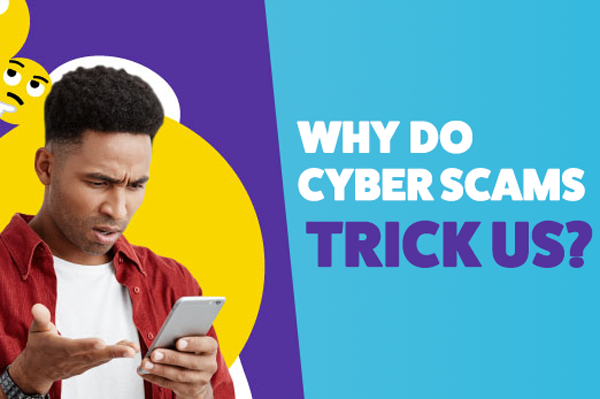As we head into one of the most festive times of the year, we know unfortunately, that scammers, fraudsters, and cyber criminals like to take advantage of the holidays and can use this time to carry out an even higher number of scams. In order to avoid being scammed, take a moment to review the scams below, and enjoy a safe and peaceful holiday and scam free year ahead.
Holiday Scams – Watch out for the scammers preying on holiday activities, e.g., claiming there is a problem with your Canada Post parcel, gift delivery, credit card payment, on-line purchase, PayPal account, travel arrangements, and even airline tickets. Always make your own independently verified contact with a business or service before believing a message from an unknown caller or email message.
Credit Card Scams –Beware of scammers calling to alert you that there have been recent charges to your credit card which have been flagged by the security department. Sometimes these come in as automated calls requesting that you press 1 to verify the transactions, or press 2 to indicate you did not. Don’t do it. These calls are scams and we’ve had a lot of them. Just hang up.
Caller I.D. Spoofing – Do not rely on your telephone caller ID to prove the identity of a caller. Scammers use technology to hide their real identities and produce fake telephone numbers and names in your call display to trick you into providing personal or financial information. They have the ability to display legitimate numbers that may appear to be a local number or even numbers that belong to banking or policing. This is why you should never share personal information with an incoming caller whom you do not know, no matter who they claim to be. Always verify phone numbers and contacts independently before sharing any information.
Payment Scams – Many scammers like to impersonate businesses or agencies with a claim they are owed money and then give you an option to pay your overdue amounts by purchasing gift cards, such as iTunes, Google Play, Amazon, Prepaid Credit Cards, etc. and providing the codes on the back of the card. Don’t do it. Gift cards are not for payments. If you’re asked to do this, it’s a scam.
Email & Website Fraud – Watch out for emails that at first glance appear to be from a legitimate business (such as your bank, phone company, PayPal, iTunes, etc…) or even a friend. It is very common for scammers to make small changes in legitimate web or email addresses to trick you into disclosing your personal or financial information for the purpose of financial fraud or identity theft.
For Your Safety Online – always check for a secure connection before entering personal information online. Sites with a secure connection have a lock symbol in the left hand side of the URL bar. Secure sites will also start with “https” (the s stands for secure). Also, if shopping online, remember to check for a company or product review, it may help you decide whether or not to proceed with a purchace.
CRA Tax Payment Scams – These scammers are busy all year and may contact you with an aggressive telephone message warning that you owe money to Revenue Canada and payment must be made immediately to avoid a fine, a police arrest, or even deportation. They may also indicate you are owed money and seek to get your personal information by fraudulently claiming you’ll get a refund. Don’t share anything with these scammers. Hang up. Call the Canada Revenue Agency directly if you have a question or concern about your taxes.
Social Insurance Number Scam – Watch out for scammers who call claiming there is something wrong with your social insurance number. In these scams the caller claims to be with a federal agency and threatens arrest if personal information is not provided. This is a scam. Never provide your SIN or other personal information to anyone unexpectedly contacting you whether by phone, text, or email.
Romance Scams – These scams are among the top 10 scams affecting Canadians and often increase over the holidays. These scammers can be lurking anywhere- dating, gaming, and social media sites. They move quickly. First stealing your heart by doting on you with attention and affection. They usually never use your name to greet you, but instead use terms like “babe” and “love”. This is because they are scamming multiple victims at once and it’s so much easier for them to call all their victims “babe”. Yes, they are charming and can send the most thoughtful messages which they have often copied and pasted from other victims. Once they capture your heart, they then move on to your bank account. Something comes up, they have a family emergency, illness, accident, travel issue, and just need to borrow some money from you, which they claim they’ll pay back. They won’t. This is a scam. Don’t send the money.
Covid-19 Fraud – 2020 brought Covid and lots of scams to go with it. The Canadian Anti-Fraud Centre reports Canadians have lost million dollars due to Covid related scams. Watch out for unsolicited calls, emails and texts requesting urgent action or payment and/or offering medical advice, financial relief, or government assistance and compensation. Do not give out your personal information through an unsolicited contact.
For more information and to stay up to date on the latest frauds and scams, please visit:
The Canadian Anti-Fraud Centre www.antifraudcentre-centreantifraude.ca or call 1-888-495-8501
www.getcybersafe.gc.ca to learn how to secure your accounts, devices, and connections
Provided by the Annapolis County Seniors Safety Program
For more information, please contact Sharon Elliott at 902-665-4481
